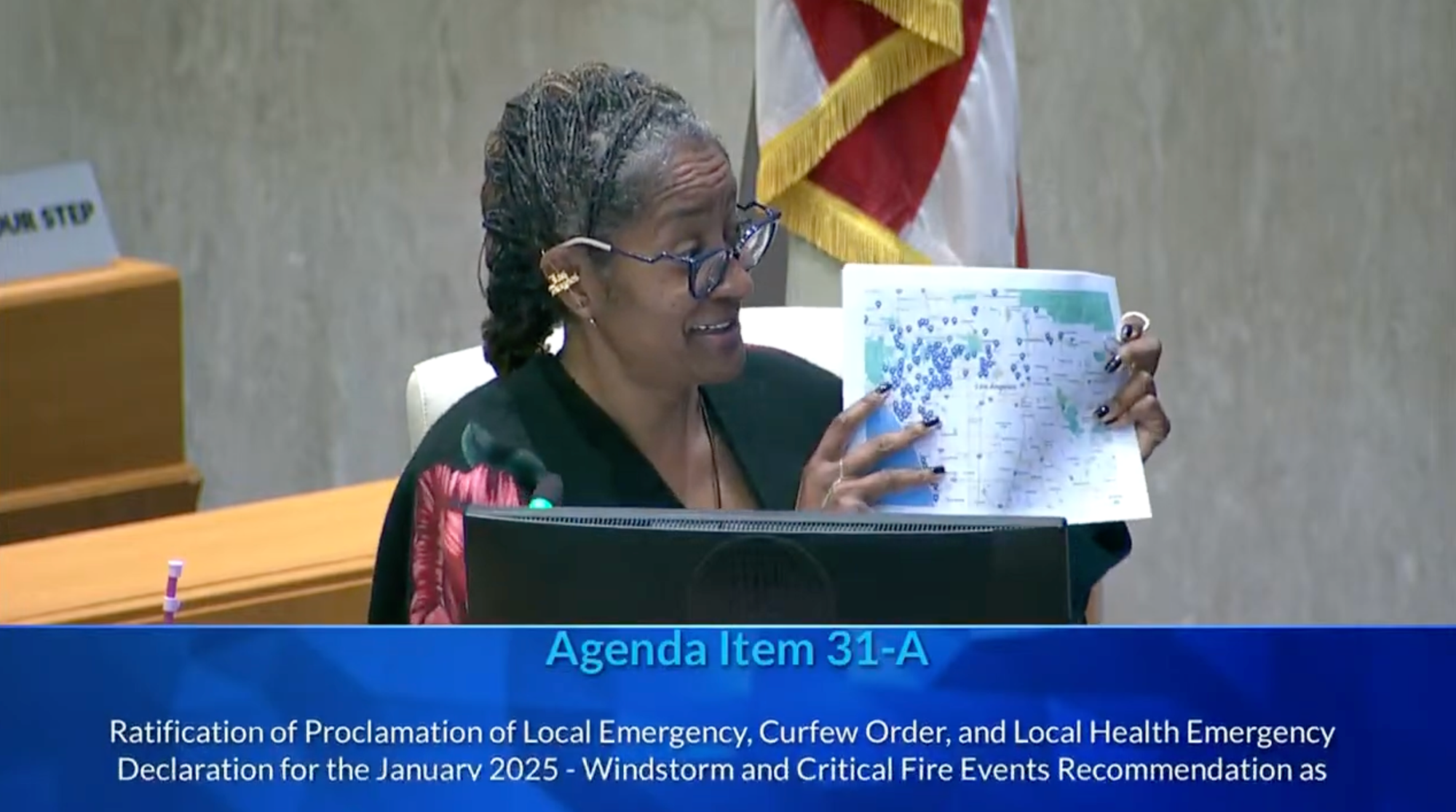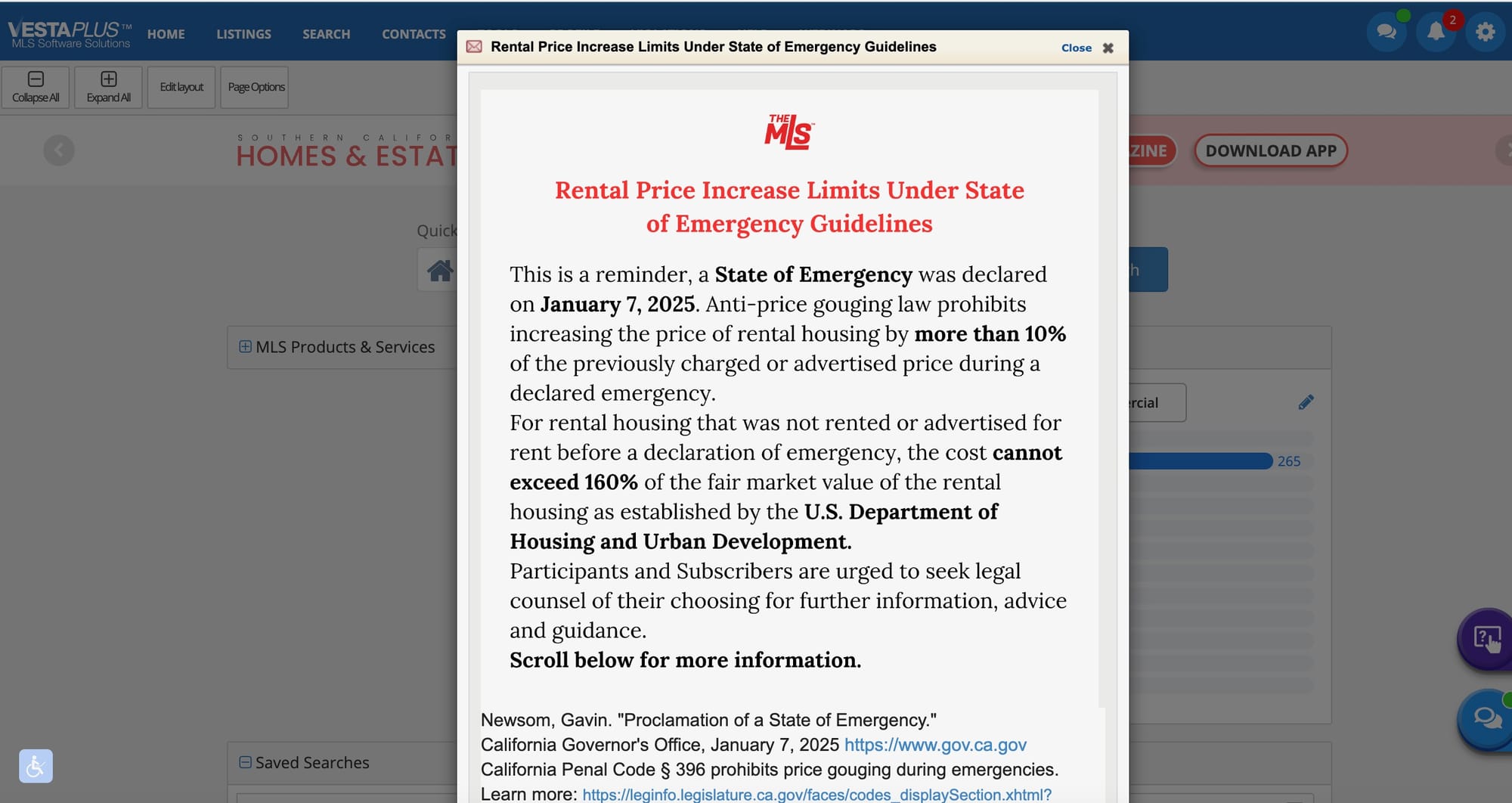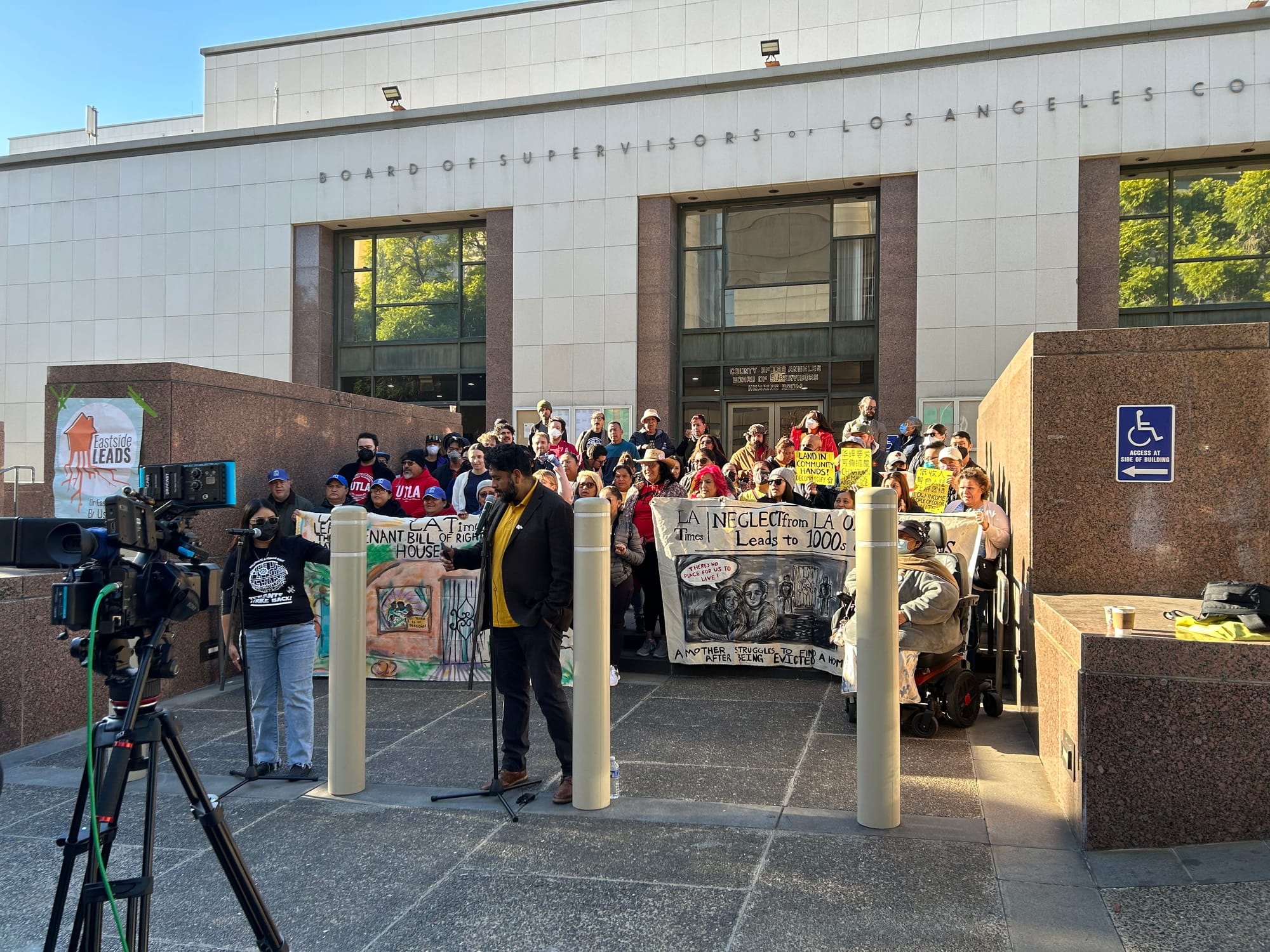Travel advisory
Sean Duffy's feigned hand-wringing on behalf of one federal department about the inconvenience of rerouting a few buses is simply revolting as another federal department is literally kidnapping people from bus stops
There's an army of volunteers at their keyboards right now, all over the country, preventing the ignition of a secondary disaster by snuffing out LA's price-gouging rentals

The day after the Palisades and Eaton Fires started, as thousands of homes across LA County were aflame, Chelsea Kirk casually perused Zillow rental listings in her Echo Park neighborhood. As a tenant organizer and director of policy and research at Strategic Actions for a Just Economy, Kirk had a hunch that an already-tight housing market was about to get tighter. She immediately saw a three-bedroom listing for $12,000 per month that raised her eyebrows. "My first thought was always that rents were going to go up," she says. "Then I looked at the price history."
The state's emergency declaration had triggered a price-gouging statute that "generally prohibits landlords from increasing the price of rental housing by more than 10 percent of the previously charged or advertised price." Zillow's own price history feature easily confirms the date and dollar amount, and some increases she saw were well over 10 percent. Kirk, who has the legendary handle @bad_tenant, had started gathering the most egregious examples when she saw data from real estate agent Samira Tapia, who had been compiling her own suspicious listings. It was gutting proof of Kirk's theory. Thousands of displaced families were being thrust involuntarily into the country's most unforgiving rental market. And landlords were responding by illegally jacking up rents.
"My plan was to make a spreadsheet and share it on Instagram with a few of my organizer buddies," says Kirk. But the posts went viral, and more people asked how they could help. "Now we have this huge public crowdsourcing project," she says. There's an army of volunteers at their keyboards right now, all over the country, preventing the ignition of a secondary disaster by snuffing out LA's price-gouging rentals. Their work was acknowledged at LA County's Board of Supervisors meeting this week, where Supervisor Holly Mitchell held up a map of the reported properties plotted across the region.

Kirk's spreadsheet, now named the LA Price Gouging Tracker, currently shows 1303 properties, about 100 more than yesterday. About 75 volunteers are currently working on the project: sorting through submissions, offering free legal support, and calling the city to make reports. Kirk has an entire tech team that built a web scraper for Zillow and is working on creating visualizations of the data. Sometimes the rent gouging can be confirmed by demonstrating a simple 10 percent or more increase, but other cases require more complex calculations: for rental housing that was not advertised before the fires, for example, the price can't exceed 160 percent of the Department of Housing and Urban Development's fair market value. So the tech team built a tool to automate that process. The project now has three different intake forms where people can report properties; volunteer; or share a personal account of being impacted by price-gouging.
Even before over 12,000 structures were lost to LA County fires — with many more damaged, without power, or uninhabitable due to smoke — finding an apartment in LA was a disaster. Prospective renters are told to prepare for bidding wars. But even real estate agents weren't prepared for the gouging they witnessed this week. My realtor friend Laura Kate Jones was scrambling to get clients housed when she started to notice every listing she was tracking was undergoing dramatic price increases. She told the New York Times she had booked an appointment to tour a Beverly Hills rental two days after the fires started with a mom of two who lost her Pacific Palisades home. When they got there, the listing agent raised the monthly cost by $3,000 on the spot.
These price increases are so egregious that listing agents are calling out their fellow realtors. Social media is filled with agent PSAs. Even celebrity realtor Jason Oppenheim says his clients are being gouged, with one property owner asking $23,000 for a $13,000 listing. Interestingly, the brigade has been examining an Oppenheim Group Hollywood Hills listing which volunteers determined did, at one point, appear to violate the law by advertising price gouging, then brought the price back down. Maybe they, too, learned their lesson?

But the agents aren't always to blame. "There is also the reality that landlords and owners are pressuring their agents to do as they instruct, despite the unlawfulness of such practice," says Pinky Jones, another realtor friend of mine. California Attorney General Rob Bonta, who said the state is building cases already, sternly warned that price-gouging violators could be subject to a $10,000 fine and possible jail time. The threat of that punishment is not likely to deter someone like the owner of the Bel Air property that LAist's David Wagner found listed at $29,500 per month — an 86 percent (!!!) increase from the previous $15,900 per month rent.
At a Wednesday press conference, LA County District Attorney Nathan Hochman delivered a stern message directly to landlords. "If we go ahead and find out you've engaged in price gouging, and you've taken no steps to remedy the violation, we will prosecute you to the full extent of the law," he said. "Not only will you be looking at criminal penalties, you will be looking at civil penalties, and, as importantly, your name will get out there, your company's name will get out there. You will be publicly shamed."
That last part seems to be the biggest motivator so far. Kirk says landlords have been contacting her asking how they can get off the list. (They can't.) But the wall of shame still seems to be working. Comparing MLS data from January 9 until January 16, Tapia reported yesterday that incidents of rent-gouging had dropped by 75 percent. Changes might also be happening at Zillow, where a representative told the Los Angeles Times the company is doing internal reviews to find potential violations. But this is a situation where naming and shaming can potentially produce much faster results than the threat of government enforcement.
Although if you ask the Apartment Association of Greater Los Angeles — a powerful landlord lobbyist that has many local electeds in a stranglehold — this strategy will backfire. A representative told KCRW that everyone should be nicer to "housing providers" or landlords will withdraw their listings from the market. (That's likely happening a little bit anyway, with a "whisper network" of listings being shared among realtors.) The representative then called the spreadsheet “unfounded" claims by tenant groups "who are looking for another rent freeze."

That's exactly what the tenant advocacy coalition Keep LA Housed is demanding —along with an eviction moratorium and enforcement of price gouging laws. This week, Councilmembers Eunisses Hernandez and Hugo Soto-Martínez introduced an emergency tenant protection motion for LA city which would include monthly rent-gouging reports. Shockingly, the motion wasn't voted on right away, it was sent to committee. Even though renters occupy the majority of housing units in LA city, they're represented by a majority-homeowner council, many of whom are landlords. A group of now-former councilmembers were so scared of renters that they had a whole conversation about how they plotted to take power away from them.
On Wednesday night, a group of volunteers gathered at Kirk's apartment to contact property owners. Kendra Miller, a screenwriter and creative director who had been tapped in two days before to coordinate the volunteers making 311 reports, was having COVID flashbacks. "People are traumatized," they say. "If they can take their lunch break and do 10 listings in 40 minutes, they are really doing something that's helpful." And when it comes to the reporting, they say, there is power in numbers. "The more people call in, the more the city knows there’s a demand for creating change."
Still, Zillow isn't catching all the potentially gouged rentals that displaced households are fleeing to in LA County. There are about 40,000 housing units across LA that are being used as short-term rental properties, withholding long-term housing from the market. Which is why the LA Price Gouging Tracker now takes submissions to report short-term rental price gouging, which is subject to the same laws, per the attorney general's statute.

After major disasters, Airbnb.org, Airbnb's nonprofit arm, works closely with local officials to integrate its short-term rentals into the response. Last week, Airbnb.org said it had offered 6,500 rental offers so far and made a commitment to provide "free, emergency housing for an additional 25,000 people" in LA after the fires. (Multiple people have told me they've signed up for this and not heard anything back.) Airbnb is also encouraging Angelenos to sign up as a host to house displaced people. And here's the megaevent twist — there always is one! — Airbnb is the IOC's global Olympics sponsor. And long before the fires, Airbnb had been actively recruiting LA property owners with the aim to add tens of thousands of new hosts — maybe, say, 25,000? — leading up to 2028.
Airbnb is not regulated like long-term rentals. The price history, for one, isn't as easy to track as it is on Zillow, so proving gouging is tougher. As I noted in a May story for Dwell, LA city passed a home-sharing ordinance in 2018 but the city is too understaffed to enforce it, recently acknowledging that it can take two to three years to investigate any type of violation. Currently in LA County, a person staying in a short-term rental for more than 30 days has the same renter rights as long-term tenants, but a new state measure introduced this week would lift that rule, meaning people staying in Airbnbs longer than 30 days all over LA would be in situations where they have no tenant rights.
That's a huge concern for Noel Sullivan, who evacuated his Pacific Palisades home on Tuesday. The home is still standing, but smoke damage will make it unlivable for months. Confronted with stratospheric rental listings and the desire to bring his family some stability fast, Sullivan decided that an Airbnb would be the best option. He found a Westwood property for $20,000 per month that looked nice in photos, but was "pretty dumpy" in person. Sullivan got the host to come down to $16,000, but then he happened to see a Google ad for an Apartment.com listing of the unit — for $5500 per month. After unsuccessfully messaging with Airbnb support, Sullivan, who works in tech, says he networked through his connections to some Airbnb execs, and threatened to report the listing to the state. The whole situation has made him realize what little leverage he has as a renter. "We have a $5.5 million home but now we're put in this very vulnerable position," he says. "I don’t know where we go next."
Now even wealthy homeowners are experiencing the brutal unfairness of LA's broken rental market — Palisades Tenant Union when? — which Kirk says is giving people who may not have ever been in this position an unwanted peek inside LA's housing crisis. "It's just ordinary people not related to renter advocacy. They’re seeing the greed of the landlord class — and how clearly it contributes to affordability," she says. "That has been one of the greatest things to come out of this." 🔥